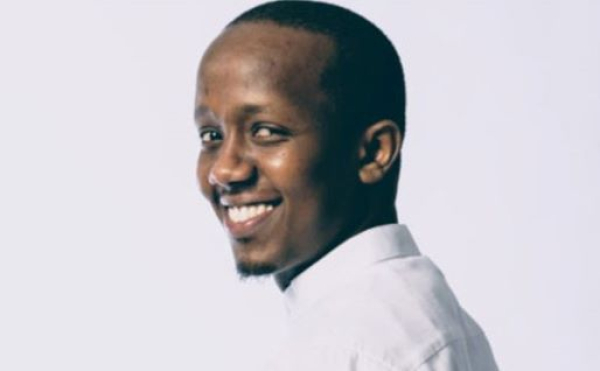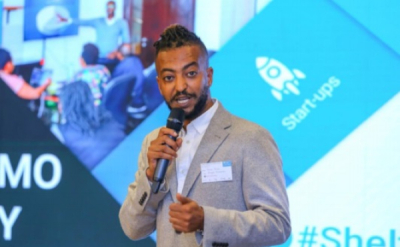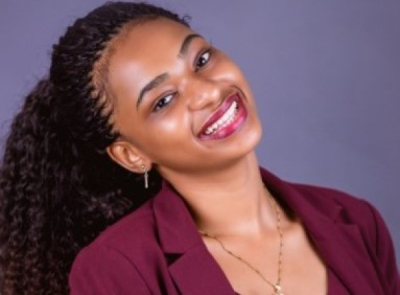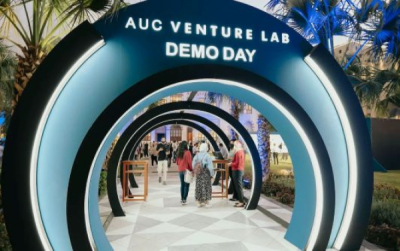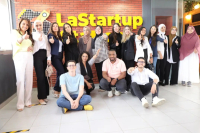
TECH STARS (1007)
This entrepreneur is leveraging his software development skills to make online learning more flexible globally. He aims to prepare the youth for the job market through his startup.
Musa Turay is a software developer with expertise in web and mobile app development, database management systems, DevOps, and user experience design. He has several years of diverse project experience.
Musa holds a Higher National Diploma in Information and Communication Technology from Sierra Leone’s Eastern Polytechnic (2021) and a Full Stack Web and Mobile App Development Certificate from Orange Digital Centre, along with various online certifications.
In 2019, he founded TurayMathic e-Learning Technologies to offer flexible online learning experiences globally. His aim, through the startup, is to democratize education, empower individuals, and make them career-ready. “My vision is to provide Sierra Leoneans and worldwide students with flexible and rigorous online learning experiences that equip them with the knowledge, skills, and characteristics necessary for career readiness,” he said.
TurayMathic e-Learning stands out with cutting-edge AI-driven instruction, global accessibility, career readiness focus, educator support, and a thriving community, offering personalized learning, multilingual courses, real-world projects, industry partnerships, affordability, security, social impact, and continuous innovation.
As the founder of TurayMathic e-Learning Technologies, Musa aims to be recognized as a leader in innovative instructional technologies, ensuring education reaches everyone globally, and fostering a digital community for continuous learning, communication, and collaboration.
In January 2022, he was incubated at the Orange Digital Centre, gaining valuable insights and skills in programming, database management, and more. Participating in the program provided me with a valuable opportunity to delve into high-level programming and gain a comprehensive understanding of software development, he said.
Throughout his career, he has worked on diverse projects, ranging from web and mobile applications to backend systems. His immediate plans include excelling in his current role and pursuing advanced training. Musa aims to shape the future of software development positively as technology evolves.
Hikmatu Bilali
His company, Charis UAS, manufactures self-driving cars that leverage artificial intelligence to generate 3D geospatial data in near-real time. These innovations earned him numerous awards and distinctions.
Eric Rutayisire Muziga (photo) is a Rwandan entrepreneur who graduated from the University of Minnesota with a master's in electrical and electronic engineering. He is the founder and CEO of Charis Unmanned Aerial Solutions (Charis UAS), the first drone manufacturing company to be licensed in Rwanda.
Launched in 2014, Charis UAS harnesses the power of artificial intelligence and cutting-edge technologies to deliver timely and accurate 3D geospatial data to help industries make smart decisions. It specializes in building and integrating sensor systems, drones, and data solutions to deliver high-quality service. The company covers several countries, including Senegal, Côte d'Ivoire, Ghana, Gabon, the Republic of Congo, DR Congo, Angola, Uganda, Kenya, and Tanzania.
Charis UAS developed Inganji, a drone technology “wholly designed and manufactured in Rwanda by Rwandan engineers and pilots with thousands of flight time experience.” According to its designers, the technology boasts notable features such as high data security, energy efficiency, high resolution, and an intelligent zoom camera. It is suitable for security and surveillance applications, we learn.
Charis UAS has also developed a digital project manager for critical infrastructure projects. Called Charis Analytics, it digitizes worksites and tracks projects in near-real time with actionable information while enabling collaboration with all stakeholders and accelerating project completion.
In addition, the drone company has designed a drone capable of eliminating mosquitoes over large areas, thus contributing to the fight against malaria. The device, equipped with a 10-liter tank containing insecticide that destroys mosquito breeding sites, was immediately adopted by the Rwandan government.
The CEO is a member of the board of directors of venture capital and private equity company Crystal Ventures. His works have earned him several distinctions. In 2019, he made it to the tech category of the Forbes 30 under 30 list. He was also in the top 3 of the All Africa Business Leader Award. Through Charis UAS, he is one of the winners of the 2023 Google for Startups Black Founders Fund.
Melchior Koba
Amid fast-paced technological development worldwide, innovation has become a driving force for social progress. In Africa, Pangea Accelerator stands as a beacon of hope for budding entrepreneurs.
Co-founded in 2017 by Jonas Tesfu, Pangea Accelerator is a Norwegian acceleration program and investment platform that provides African start-ups support, mentorship, and funding.
Through mentorship, workshops, networking opportunities, and initial financing, Pangea Accelerator equips start-ups with the necessary tools to transform innovative ideas into impactful businesses. Currently, most of these actions are carried out in Kenya.
The accelerator develops several programs such as The Young Ventures Accelerator Program 2.0. Supported by GIZ, this program runs over six weeks, followed by a six-month mentorship session, and targets innovations or start-ups in the affordable housing sector located within a 70 km radius of the Nairobi metropolitan area.
The Pangea Scaleup Program, which is also a program of the accelerator, finds the best-expanding businesses and grows them from the seed phase to the Series A phase. It targets start-ups active in sectors such as fintech, health tech, logistics, agriculture, renewable energy, and other digital solutions.
Pangea Accelerator also produces other local acceleration programs based on key stages and focused on validation and scalability. It hosts a series of events centered on Africa's development, investment, start-up ecosystems, and policy.
The accelerator is supported by several national and international institutions, including Microsoft, The Factory, IKEA Foundation, Katapult Accelerator, AfriLabs, Innovation Norway, UK Kenya Tech Hub, and African Business Angel Network, among others.
Melchior Koba
The young innovator is behind several technological projects in Tanzania. She has won several national and international awards and distinctions. Through Vide, her latest company, she enables professionals to create and sell courses, therefore sharing their expertise.
Tanzanian-born Sophia Abeid (photo) is a telecom engineer and tech entrepreneur. She graduated, with a Bachelor of Science, from St. Joseph University’s College of Engineering and Technology in 2018. She is also the co-founder and CEO of Vide, an online “marketplace for educational life skills or digital learning video content.”
Launched in 2022, the Vide app enables professionals in various fields, from bakers to accountants, to create and sell courses on the platform, therefore sharing their expertise while generating revenue at the same time.
On August 10, 2023, Vide was named one of 20 pioneering start-ups led by female entrepreneurs to take part in the fourth edition of the "Future is Female" mentoring program. This nomination gives Sophia Abeid, the CEO, the opportunity to get personalized mentoring, participate in workshops and networking events and even access investment opportunities.
Before Vide, the CEO had co-founded "Blueprint Innovations", a company specializing in digital solutions. She is also the creator of the File Tracking System (FTS), a software designed to help organizations easily locate internal files. This software is widely adopted by companies in Tanzania.
Since June 2021, she is working as a Subscriber Data Management and telecom infrastructure specialist at Vodacom Tanzania Plc, which she joined in August 2019. In August 2021, she joined the Global Youth Leadership Advisory Board of the Digital Opportunity Trust, a movement of bold young social innovators who have the tools, knowledge, and networks to create opportunities and transform their communities.
For her works, Ms. Sophia Abeid has received several awards and distinctions. In 2018, while still a student, she became the youngest winner of the Next Einstein Forum's Africa Science Week in Tanzania for emerging women in science, technology, engineering, and mathematics (STEM). In 2021, as an employee of Vodacom Tanzania Plc, she won the Best Female Graduate Engineer award issued by the Institute of Engineers.
Melchior Koba
As a start-up accelerator, AUC Venture Lab supports and promotes entrepreneurship and innovation by providing entrepreneurs with learning opportunities, mentoring, networking, and access to potential investors.
AUC Venture Lab (V-Lab) is Egypt's first university accelerator. Founded in 2013 by Ayman Ismail, Associate Professor at the American University in Cairo (AUC) School of Business, its aim is to assist entrepreneurs in launching, growing, and transforming their startups. It also aims to provide the AUC community with a learning and research platform, thus fostering its involvement with entrepreneurs.
To achieve its objectives, V-Lab has developed several programs, including Startup Accelerator, Fintech Accelerator, AUC Angels, and Startup Launchpad.
Startup Accelerator is a four-month program launched to help entrepreneurs design and develop the next generation of innovative technology start-ups. As the accelerator’s flagship program, it is supporting entrepreneurs since 2013.
Fintech Accelerator is a customized four-month program dedicated to financial technology start-ups. It provides founders with intensive business and technology support, mentoring, and networking opportunities to help them refine their solutions and prepare for investment. Target sectors include payments, insurtech, wealth management, loans and savings, infrastructure, and more.
Startup Launchpad is a nine-week immersive program for entrepreneurs and future founders at the idea stage. AUC Angels is the first university network of angel investors in the Middle East and North Africa. Created with the aim of bridging the financing gap for young technology companies, the network connects approved start-ups with accomplished professionals from a variety of sectors and backgrounds.
To date, V-Lab has helped over 1,000 founders transform their business solutions into viable, investment-ready technology start-ups. It has created over 12,000 jobs, supported more than 341 start-ups in various technology sectors, and raised more than $161 million.
The accelerator has received several national and international awards for its impact and the quality of its services in the entrepreneurial ecosystem. In 2021, it was named the best accelerator/incubator in North Africa by the Global Startup Awards. It was named the best challenger in the Middle East and North Africa by UBI Global World Rankings 2021-2022 of business incubators and accelerators.
Melchior Koba
With over ten years of experience in tech entrepreneurship, she has founded two companies that develop useful tech solutions adapted to African markets. Her entrepreneurial drive and innovations have been celebrated with several awards and distinctions.
Olajumoke Oduwole (photo) is a Nigerian entrepreneur and computer scientist. She graduated, in 2015, from the University of Lagos with a Master's in systems engineering with a major in artificial intelligence and software.
In 2021, she co-founded the fintech startup Alajo, of which she is currently the CEO. Through its eponymous application, her startup digitizes savings and credit transactions via a USSD infrastructure. The said application is designed for merchants, fast-growing businesses, unbanked, and even underbanked individuals. It has already helped its users save over 373 million naira (443,600 euros).
“Opportunely, the under- and un-banked now have access to financial products, services, and opportunities from corporates through data analyzed from their transactions,” Ms. Olajumoke told Disrupt Africa in April 2023.
Thanks to Alajo, Olajumoke Oduwole and Eniola Oladeinde (the co-founder of Alajo) took part in the Google for Startup Accelerator: Women Founders program.
Before Alajo, Ms. Olajumoke had already founded, in 2014, KJK Africa, a software development firm that creates sustainable software products and offers services aimed at increasing business efficiency, strengthening customer relationships, raising the visibility of operations, and increasing sales.
From 2012 to 2013, she worked for Bethel Group of Companies as a senior developer and IT manager. She also headed the brand, IT, and digital transformation departments at RegCharles Finance & Capital from 2013 to 2014. In 2018, she was a communications consultant to the Presidential Council for an Enabling Business Environment, Nigeria (PEBEC-EBES).
She has received several distinctions and awards for her work. In 2018, she was a top 10 finalist in the Seyi Tinubu Empowerment Program's Rising Tech Entrepreneur. In 2020, she made it to the Forbes Africa 30 Under 30 list.
Melchior Koba
An Ivoirian entrepreneur, Rukayatou Saka (pictured) is the founder and CEO of Paiement Pro. She holds a degree in computer engineering obtained in 2012 from the School of Multimedia Specialities in Abidjan (ESMA) and a master's degree in data engineering obtained in 2021 from ISM Paris.
Paiement Pro is an online platform that allows its users to accept payments via mobile money solutions (like Orange Money) or by credit card. The platform was created in 2019. Secure, it fosters online selling and online businesses in Côte d'Ivoire, Benin, Burkina Faso, Niger, Mali, and Senegal.
Paiement Pro is a product of Amira Global Technology, which was founded by Rukayatou Saka. Established in 2008, Amira Global Technology is a digital transformation consulting company, involved in the design and development of digital solutions. Apart from Paiement Pro, the company has developed Doumgba Marché and Liste de Mariage.
Liste de Mariage is a web platform that allows future spouses to digitize their wedding list and enable friends and acquaintances to offer them gifts online, via VISA and Mastercard credit cards or mobile money (Côte d'Ivoire, Benin, Burkina Faso, Mali).
Doumgba Marché is a web platform that improves the value chain in the production and sale of agricultural products. It connects the producer with the nearest transporter for the shipment of the product, thus allowing the production to be sold online.
To date, Amira Global Technology has completed 1,175 projects and developed more than 8 large public platforms. In 2021, the Jack Ma Foundation ranked it among the top 50 African companies. The same year, Rukayatou Saka received the national excellence award for the best female digital initiative of the year. Also in 2021, she was one of the 50 finalists in Africa's Business Heroes.
La Startup Station, an accelerator for tech startups based in Morocco, plays a crucial role in developing innovation and entrepreneurship in the country. By fostering collaboration between startups and large companies, it creates opportunities for local entrepreneurs and startups.
Founded in 2017 as La Startup Factory, La Startup Station promotes the startup mindset within large public and private institutions to democratize the culture of technological innovation and entrepreneurship. The accelerator is led by its founder, Mehdi Alaoui, who sets up various programs to support innovation and digital transformation. It offers a tailored acceleration plan for startups, regardless of their development stage (ideation, prototyping, or launch).
The tech hub helps budding entrepreneurs test their idea’s viability and make it fruitful. For those who already own a business, it assists in structuring market access, validating their proof of concept, setting up the minimum viable product (MVP), and finding financing.
La Startup Station also helps entrepreneurs develop their businesses and scale up by implementing a growth strategy that includes access to suitable financing solutions.
In addition to its acceleration programs, it has also set up La Startup School, a fully digital and free program that includes workshops, expert interventions, entrepreneurs and entrepreneurship trainers, as well as advice and best practices.
The accelerator also organizes several events, like the Global Industry 4.0 Conference on July 26, 2023. The event aims to bring together companies and actors working in the field of artificial intelligence, the Internet of Things (IoT), big data, robotics, and automation.
So far, La Startup Station has supported 5,000 established startups and financed 65 startups. Thanks to its investor partners, 14 startups have already completed at least one fundraising round. The accelerator has launched more than 50 open innovation programs with large companies, raised awareness about innovation and collaboration with startups among over 100,000 employees, managers, and senior executives, and enabled the deployment of over 29 innovative digital solutions within companies.
La Startup Station’s partners include Facebook, Sanofi, Société Générale, the World Bank, GIZ, BNP Paribas, Leoni, LafargeHolcim, Bymaro, Vinci Energies, and BMCE Capital.
Melchior Koba
Many graduates end up without a job or with underpaid jobs. To tackle this issue, Ayman Bazaraa launched Sprints to guarantee that youths have decent jobs. He gives them personalized training.
Ayman Bazaraa is the co-founder and CEO of Sprints, an ed-tech company. The Egyptian studied at the University of Cairo where he obtained a Bachelor in Electronics and Communication in 2004. In 2014, he studied Leadership, Finance, and Management at the European Centre for Executive Development.
Sprints was founded in 2019 to unlock the potential of 100 million curious learners and help them develop essential skills in the AI era. The ed-tech company assesses the youth who register for its courses and offers a personalized learning path.
Once they have reached the end of the path, the startup guarantees a well-paid job in big tech companies, in Egypt and around the world. It also supports its students’ careers. With Sprints, Bazaraa was picked among the 50 finalists of Africa’s Business Heroes 2023. He also won the final qualifiers of the "El Forsa with Lamees El Hadidi" television competition for startups.
Before Sprints, Ayman Bazaraa co-founded MicroDoers in 2012, a company that provides innovative augmented reality solutions to a broad base of clients in the United States, Europe, and Asia. In 2015, he also co-founded Avelabs, a provider of integrated solutions and services for the automotive industry.
Before his entrepreneurial years, Bazaraa worked for Orange Egypt as a software engineer starting in December 2004. He joined IBM in 2005, initially as an embedded software designer, then as a team leader of over 20 software engineers. In 2011, he became the director of automotive supplier Valeo in Egypt and founded the department of software experts that now supports all the company's projects worldwide.
Melchior Koba
The computer scientist uses programming tools to find lasting solutions that will help his community and country as a whole.
Umar Bolokada Mansaray is a Sierra Leonean entrepreneur and self-taught computer scientist with expertise in front-end, mobile development, and UI/UX design. He co-founded Smart H2O in 2022.
Smart H2O aims to revolutionize water purification using computer programming tools. With his startup, Bolokada won the Community Mining Innovation Challenge the same year.
Umar Bolokada grew up in eastern Sierra Leone, a mining region with abundant natural resources. However, due to mining activities, the region was plagued with significant water pollution, and consequently, people in the area had low access to clean and safe drinking water. Bolokada, therefore, felt a deep responsibility to solve this problem and help his people.
Smart H2O works on building an advanced system using Arduino (an open-source electronic prototyping platform) and the Internet of Things (IoT) to detect and purify polluted water. By employing cutting-edge technology, the system can rapidly analyze water samples, identify contaminants, and apply appropriate purification methods. This process proves to be more efficient, cost-effective, and eco-friendly compared to conventional purification techniques.
The turning point in Bolokada's journey came in late 2022 when he “was introduced to the Orange Fab lab through a supportive friend and mentor.” This incubation by Orange Fab proved to be a game-changer, “providing vital resources, mentorship, and access to a wide network of experts and investors,” he revealed. This support accelerated Smart H2O's development, enabling Bolokada and his team to refine their algorithms, conduct real-world tests, and expand their research in regions facing water contamination challenges.
Though at its infancy stage currently, Bolokada “aims to reach many communities and expand beyond Sierra Leone in the coming years.”
Before founding Smart H2O, Bolokada had launched another startup called Kam Rent Ya in 2020, which aimed to simplify the rental process for housing seekers. Available on the web and mobile, the solution helps users find and rent properties remotely.
Beyond his entrepreneurial ventures, Bolokada worked as a UI engineer for Women Power Africa, an organization advocating for gender equality, in 2020. The following year, he founded Her Choice, a non-profit organization dedicated to empowering women and girls. Umar Bolokada Mansaray exhibits genuine leadership and innovation, poised to drive substantial transformation in the domains he operates within.
Hikmatu Bilali
More...
Andrew Takyi-Appiah has worked in the world of finance for more than 15 years. He has expertise in the field of banking and mobile payments. The company he heads strives to improve financial inclusion in Africa.
Andrew Takyi-Appiah is a Ghanaian entrepreneur and business leader who obtained a bachelor's degree in Business Administration from the University of Hull in 2002. He also holds a postgraduate degree in Management obtained in 2005 at UCLA. In 2021, he obtained the same degree in fintech at Saïd Business School, University of Oxford. Talyi-Appiah is the Co-founder and Managing Director of Zeepay.
Founded in 2016, Zeepay is a fintech startup that aims to improve financial inclusion and make the world a better place to live. Leveraging partnerships with money transfer operators, the startup allows international fund transfers and ATM cash withdrawals.
Also, it allows holders of prepaid or debit VISA cards to receive money directly onto their cards within minutes. Zeepay has already conducted over 1,000,000 transactions across 23 countries in Europe, North America, and Africa and will soon be launched in Côte d'Ivoire.
In March 2023, Andrew Takyi-Appiah received the Fintech Leader of the Year in Africa award at the CEO Summit for the second consecutive time, highlighting his critical role in the growth and advancement of sub-Saharan Africa's economic landscape. More recently, he was selected among the 50 finalists of Africa’s Business Heroes.
"At Zeepay, we are ready to provide our support and advice and invest in any innovative fintech idea that has a lot of potential and aims to benefit the ordinary African. Zeepay is for Africa, and we look forward to growing with Africa. We will continue to harness African human resources and innovations to drive growth," said the entrepreneur in 2022.
Before launching Zeepay, he worked in several financial institutions like GTBank, where he was in charge of corporate banking in 2007, and Ecobank Transnational Incorporated from 2007 to 2011. Between 2011 and 2013, he worked at PwC, and between 2013 and 2016, he was at UT Bank Ghana.
Melchior Koba
Benin, like most African countries, considers the digital economy as an important component of its development. One of the actors advancing technological innovation in the country is EtriLabs hub.
EtriLabs is both an innovation ecosystem and a community of individuals keen to co-create and collaborate on projects aimed at solving major problems at the national and international levels.
Founded in 2009 by Senam Beheton, its CEO, Etrilabs’s vision is to foster an entrepreneurial culture focused on innovation, creativity, and sharing, by creating an environment conducive to the emergence of world-class solutions.
Like most innovation centers, EtriLabs offers a well-equipped co-working space for entrepreneurs, designers, developers, and marketing specialists.
The hub is based in Benin and Senegal. In the former, it has two centers in Cotonou (South) and one in Parakou (North). In the latter, it has one center in Dakar, the capital. Its three areas of intervention are ecosystem development, enterprise acceleration and incubation, and digital innovation. As part of ecosystem development, it provides several digital training programs, such as the Learn2Code camp which trains children in computer programming and graphics.
With EtriStars, which regroups all its acceleration programs, EtriLabs meets the needs of young companies and helps them overcome the challenges they face by providing them with support and access to essential resources.
EtriLabs also offers tailored solutions to businesses, individuals, non-governmental organizations, and governments. Whether it's developing a brand image, introducing an innovation strategy within the institution, or integrating new digital technologies, the center helps its trainees achieve their goals.
Besides training programs, EtriLabs offers workshops and seminars on various topics. It also organizes events to promote networking, product and service demonstrations, and fundraising.
With the help of its partners, EtriLabs has supported more than 1,000 entrepreneurs in 14 sectors of activity. Among the companies it has supported are fintech FedaPay, Ylomi which connects artisans with potential clients, and healthtech Rema.
Melchior Koba
After he completed his master's degree in energy economics in France, he returned to his home country where many people still struggle to have electricity. There, he founded ARESS, an innovative solution that solves this issue through solar energy.
Léonide Michael Sinsin (pictured) is a doctor in energy economics, who graduated from the Paris Dauphine University. He completed his whole schooling in France, and in 2012 during a trip to Benin, his country, he founded with Paul Berthomieu, a classmate who went with him, African Renewable Energy System Solutions (ARESS). Sinsin had just completed his Master’s. He is ARESS’ CEO.
ARESS is a small and medium enterprise (SME) specializing in the field of renewable energies. Active in Benin, Togo, Burkina Faso, and Senegal, ARESS sells solar equipment, sets up solar installations, and provides energy audit and maintenance services.
At first, the business was selling energy equipment but quickly realized that rural customers had issues making the payments, despite having the capacity to pay in installments spread over months.
Sinsin and Berthomieu, however, found a way around this challenge. They set up a system that automatically deactivates the equipment in case of non-payment. Buyers could still pay in installments over 36 months.
In 2016, the new startup, MyJouleBox, which develops equipment, software, and economic and social solutions to innovate in solar development, was born from this Pay As You Go model. In 2022, the company was part of the top 45 most innovative startups in Africa at the AfricaTech Awards.
Since 2022, Léonide Michael Sinsin has also been the president of the Interprofessional Association of Renewable Energy Specialists of Benin (AISER-Benin), which promotes and defends the interests of actors in the renewable energy sectors. Between 2012 and 2015, he worked as a senior technical writer for the pan-African think tank "L'Afrique des Idées".
Melchior Koba
Hive Colab, Uganda’s first tech hub, is developing incubation and acceleration programs with the help of its partners to encourage and support digital innovation in the country.
Hive Colab is an innovation and incubation center, a collaborative workspace for the business and technology community in Uganda. Founded in 2010 by Barbara Mutabazi, Daniel Stern, Jon Gosier, and Marieme Jamme, its co-working center provides entrepreneurs with internet access, a professional and calm working environment to develop their ideas, host events, and collaborate.
As Uganda's first tech hub, it aims to encourage tech lovers from current and future generations to create and develop applications that address the country's development issues. It also fosters creativity and innovation in the youth, pushing them to develop world-renowned tech products.
The hub supports actors operating in the following sectors: education, finance, health, governance, and agriculture. It offers several incubation programs, including the Youth Startup Academy Uganda (YSAU) project, its flagship program. The latter aims to incubate 1,000 young entrepreneurs by 2024. The registration phase for the program's third cohort ended on July 15th.
The innovation center also offers acceleration programs such as the University Acceleration program, which aims to generate new startups or innovations that address society's daily challenges. The solutions will then be developed and scaled by the students themselves, with the support of Hive Colab, transforming their ideas into businesses.
The hub has already incubated several companies, including Easy Matatu, a mobility startup, and ChapChap, which helps MSMEs have more productive networks and expand their distribution area.
Hive Colab is supported by various companies and organizations, like The Indigo Trust, UNICEF, Microsoft, Seacom, AfriLabs, Village Capital, and Startup Uganda.
Melchior Koba



